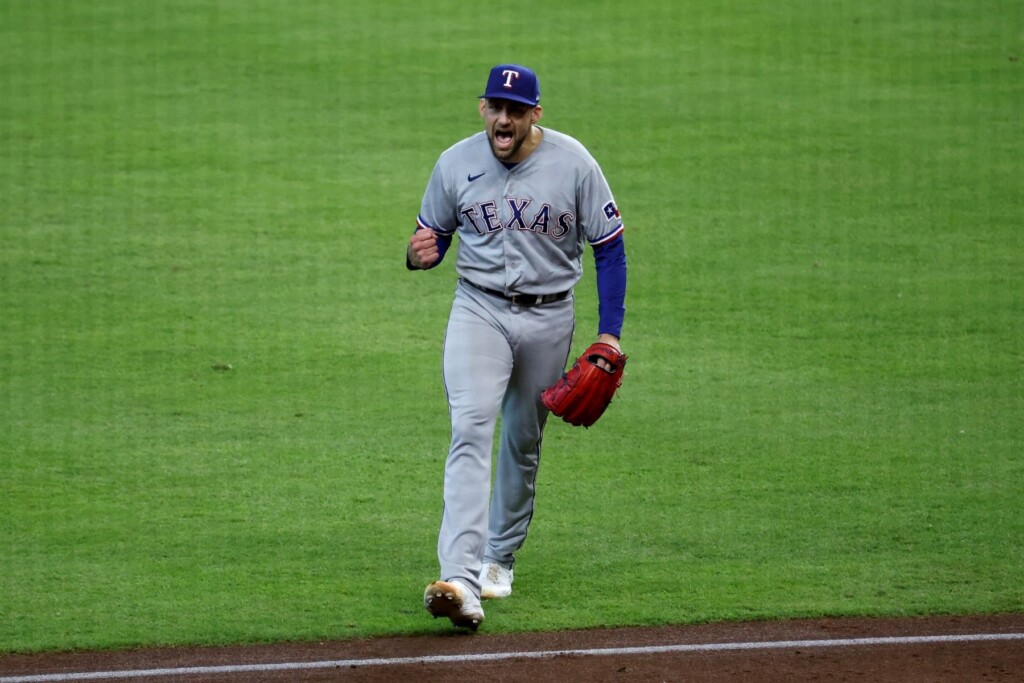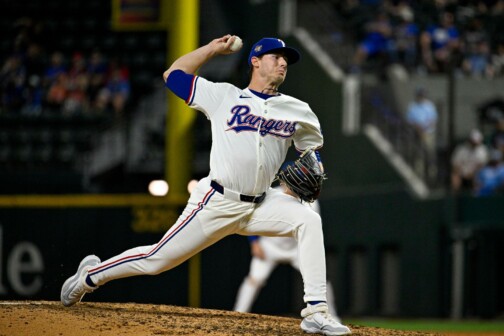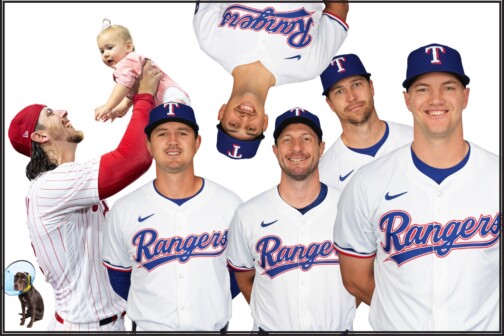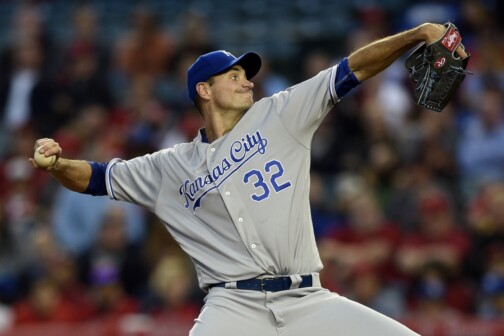Editor’s note: What’s old is new again. Mom jeans are fashionable. Same goes for loafers. You are, at most, three degrees of separation from someone with a variation of a mullet. And the Rangers are back playing October baseball.
So, back for the first time in seven years is Jamey’s Magic Number format. The premise is simple: for however many wins the Rangers have left to capture the World Series, Jamey will write that many items in this column. After taking the first two games of the ALCS in Houston, that number is now 6. If they win again in Game 3 on Wednesday night, it will be 5. And if the Rangers go all the way? Well, that’s the only time you should be excited about a Jamey Newberg column with zero to say (even though you’ll forgive him when he inevitably finds a thing or five to remark upon the World Series trophy finally coming to Arlington).
Let’s have some fun.
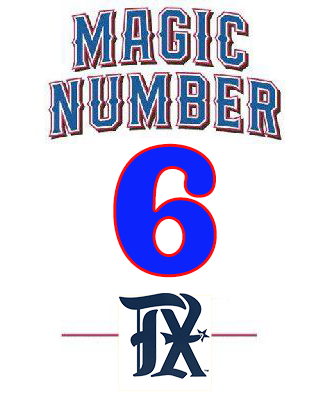
Here we go: 6 things.
6. Nathan Eovaldi threw 11 pitches in the bottom of the first inning of Game 2.
A half-inning earlier, the offense had needed 10 pitches to score three runs.
The Rangers would tack on one more in the frame, and man, they needed every one of them. More on that in due time.
The approach out of the gate was much like the one the Rangers hit Justin Verlander with in Game 1. Don’t let Framber Valdez get ahead in the count and turn to his array of chase secondaries; pounce on first-pitch strikes. Marcus Semien singled on the first pitch of the game. Corey Seager singled on the second pitch of the game. Robbie Grossman watched two pitches scrape the dirt, fouled off one sinker and let another go by in the zone, and then hit a curve 20 feet.
Valdez is a pitcher who will beat himself, but tapping a ball in front of the plate to make him a defender isn’t usually the way to goad him into it. He came off the mound, juggled the ball, got the handle, and sailed it into foul territory so far from large first baseman Jose Abreu’s orbit that he didn’t have a chance to make an effort to knock it down.
Texas 1, Houston 0.
One pitch later, Adolis Garcia took an exquisitely controlled swing and shot a sinker to right field.
Texas 2, Houston 0.
After spitting on a curveball below the zone, Mitch Garver rapped a changeup to left.
Texas 3, Houston 0.
In 10 pitches.
Jonah Heim then got rung up on a pitch that shouldn’t have ended his at-bat, as his foul tip caught dirt before Martin Maldonado secured it. Nathaniel Lowe followed with an 0-2 single to left, and it was 4-0.
One out in, and Texas had already doubled Game 1’s scoring output.
Valdez then retired Josh Jung (punching him out on yet another breaking ball beneath the zone) and Leody Taveras (flyout to center). The Rangers, having already wrested home field from the Astros with their Game 1 victory, had batted around in the first, before Big Game Nate had even taken the mound.
It was about as good as a Rangers fan could feel about the start of the game.
5. And Eovaldi delivered, setting Jose Altuve, Alex Bregman, and Kyle Tucker down with a quiet seven-strike, four-ball inning.
He threw a second straight 11-pitch inning in the second—this time with nine strikes—though one of them landed in the upper deck in fair ground. I don’t want to talk about Yordan Alvarez yet. I will.
After Heim hammered a 1-2 curve over the Crawford Boxes in the third to answer Alvarez’s bomb, restoring the Rangers’ four-run lead, Eovaldi again needed only 11 pitches (seven strikes) to get the offense back to the helmet rack.
A Bregman home run in the fourth felt preordained—even with it, he and Altuve and Tucker are now an astonishing 2 for 24 in the series—but Eovaldi settled down after that, getting Tucker to pop out, freezing Alvarez on a backdoor curve, and inducing Abreu to chase a curve down and away.
But Eovaldi’s command began to falter in the fifth, which started with Michael Brantley lining a single to left on a 3-2 fastball away. Sixteen Houston batters into the game, Eovaldi finally faced one with a runner on base—and Chas McCormick moved Brantley to second with a single to center. Jung then whiffed on Jeremy Pena roller.
The bases were loaded.
With nobody out.
But with Nathan Eovaldi on the hill.
Dusty Baker then did what I was thrilled he didn’t do in the fourth inning in Game 1, calling Maldonado back and sending up pinch-hitter Yainer Diaz, a .282 hitter who bashed 23 home runs in only 377 regular-season plate appearances. Eovaldi threw the rookie fastballs and cutters until unleashing a 2-2 curve half a foot outside the zone that produced a swinging strikeout.
Altuve was next. Front-door curve for a strike. Cutter on the outer edge, fouled off. Four-seamer upstairs for ball one. Splitter at the bottom of the zone, waved at and missed.
Next, Bregman. Eovaldi won the battle this time, getting him on the second pitch to bounce a routine grounder to Jung to end anything but a routine inning.
Just an amazing, Eovaldi-worthy escape.
Bochy entrusted him with the sixth, perhaps an unusual maneuver in modern playoff baseball, but this is Bochy and this is Eovaldi. He trusted his veteran, even with the heart of the Houston lineup getting a third look at him, more than he did Andrew Heaney (who had warmed up) or another bridge arm, and things started well enough, with Tucker haplessly swinging through a spiked curve.
Eovaldi then appeared to pitch Alvarez to a full count. Home plate umpire Mark Ripperger, however, didn‘t see the fifth pitch the same way you and I and Heim did, and Alvarez walked.
Eovaldi fanned Abreu and then Brantley got him a second time, again on a pitch he was able to get his arms extended on, doubling it to left-center and scoring Alvarez to cut the lead to 5-3. Eovaldi then logged his ninth strikeout, getting McCormick on three straight splitters below the zone, and his day was done.
Eovaldi wasn’t as sharp as he had been against Tampa Bay and Baltimore, but he was more than good enough. He has now thrown 19 2/3 innings in three playoff starts, striking out 24 and issuing only the one (questionable) walk.
He’ll pitch again this year. Whether it’s late in this series back in Houston, or against Philadelphia or Arizona, his 2023 is not done.
That’s a really good thing.
4. OK, fine: Yordan.
He and Seager, the national media’s poster boys for the series, came into Game 2 with a combined 1 for 8 ledger that included five strikeouts. Seager hasn’t broken out of it just yet: his first-inning single was a 66-mph ducksnort, and he struck out twice, each time on a pitch below the zone. But Alvarez most conclusively did.
His second-inning bomb, on a fastball up, traveled 420 feet at 108 mph. His eighth-inning shot somehow left the bat at 110 mph and was pulled to straightaway right on an Aroldis Chapman slider that was down and away. After Jordan Montgomery became the first pitcher to strike out Alvarez three times in the same game on Sunday, the pitches Alvarez deposited in the seats off Eovaldi and Chapman felt like inevitabilities.
Obviously, a two-homer game is probably a safer bet out of Postseason Yordan than an 0-fer with three strikeouts. No matter how long this series lasts and which team survives it, he’s going to be a persistent problem. The league doesn’t seem to have an answer for him. Unless you’re Montgomery, and we’ll see how that goes the second time, assuming the Rangers don’t close this out before he takes the ball again.
3. The Jung glove flub in the fifth had to be mentioned, because it set the stage for Eovaldi’s biggest moment. But it would be bad form to feature that play without giving the rest of Jung’s defensive work some burn.
His arm is strong and dependable. He has mastered the drop-step. He makes all the routine plays and consistently chips in with a huge play with the glove, sometimes in massive moments.
In Game 2, there was a backhand sprawl on a McCormick shot that took Jung into foul ground. He snared it, got to his feet, and threw McCormick out to end the second inning. There was a forehand sprawl to get Diaz for the penultimate out of the game. There were five other plays, most of which nobody will remember, and that’s a good thing. Jung is going to play a long time in this game, largely because he has the potential to do really special things offensively.
But Jung is dang near automatic on defense, and to be able to say that about a rookie is a pretty great thing.
2. On the subject of automatic things… let’s talk about the bullpen.
Even with most of Heaney, Dane Dunning, Jon Gray, Martin Perez, and Cody Bradford presumably available for relief work (one is most likely being held back as support for Max Scherzer in Game 3), Bochy turned to the same trio in Game 2 that he did in Game 1.
Apart from the first two games of the Baltimore series, in which Dunning and Bradford filled crucial multi-inning roles while Brock Burke and Will Smith made brief cameos, Chapman, Josh Sborz, and Jose Leclerc are the only relievers who have worked in the Rangers’ seven playoff games. Chapman and Sborz have appeared in five games each, while Leclerc has finished all seven, an MLB record for the start of a team’s postseason run.
As a group, they’ve been tagged with only two runs—Aaron Hicks going deep off Leclerc with a six-run cushion in Game 2 in Baltimore and Alvarez taking Chapman deep on Monday—on six hits and nine walks in 16 innings. They’ve fanned 14.
As I watched Sborz on Monday, I was trying to figure out why he’s not more consistently effective. I mean, what makes Ryan Pressly so much more reliable than Josh Sborz, whose stuff is probably better?
I think it’s the misses. When Sborz misses with a fastball up or a slider away, he often misses too much. Eovaldi and Valdez and Pressly throw plenty of pitches outside the zone, but they’re intentional misses that generate swings because they’re tunneled well and disguised and live in the zone for most of the path to the plate. With Sborz, the misses are too often non-competitive and easily rejected. He has been very good this month but it feels like the shape and outcome of his misses are what keep him from being utterly dominant.
This was the first time Bochy has gone to Chapman on consecutive days in the postseason. Part of me was hoping that Heaney, who had already gotten hot earlier, would have been called on in the eighth to face Bregman, Tucker, and Alvarez—no easy task for anyone in what was then a 5-3 game—but Chapman got the call. Bregman surprisingly tried to ambush him on his first pitch but flew to center. After going to 3-1 on Tucker, with the three consecutive balls that weren’t close, Chapman clipped the zone with a four-seamer low and away and then got Tucker to bounce out to second.
Then Alvarez homered, the lead was down to one run, and Chapman—who sat 98 to 99, clearly short of his typical velocity—was done.
Leclerc was called on to get four outs, and he did. But it wasn’t clean.
After starting Abreu off with a called strike, he missed on nine straight pitches, and most weren’t close enough to challenge Abreu or Brantley or even McCormick, who had been chasing all game. Now the tying and winning runs were on base, and Pressly was getting loose for the ninth.
But Leclerc evened the count on McCormick, a Ranger killer all year, by getting him to swing through a slambio down and away, and then coaxing a bouncer to Jung that he briefly juggled before gathering it and stepping on third to end the threat. It took Leclerc a dozen pitches, only three of which were strikes, but he escaped.
In the ninth, Leclerc worked ahead of Jeremy Pena before getting him to offer at a fastball well above the zone, hacking it to the warning track in right field. He started off Diaz with a strike, missing on his second pitch before Jung did his thing on a ground ball to his left.
Still, Altuve loomed. He let a changeup veer inside and a slambio miss outside before Leclerc shook to a cutter and landed it for a called strike. A changeup missed the zone and the count was 3-1, with Bregman waiting on deck as the winning run. But after four pitches that cut in or or faded away, Leclerc went up with 98 and got Altuve to sky it to center, where Taveras squeezed it for the final out of what could conceivably be the final game played in Minute Maid Park in 2023.
Bochy asked Leclerc to get four outs. On no days’ rest. In fact, in a day game after a night game.
The manager is working the closer hard, but it’s that time of year, and Leclerc is responding.
1. The Rangers are now 7-0 in the postseason and have trailed for one single inning: the first inning of Game 2 in the ALDS, when the Orioles scored twice and Texas promptly responded with a five-spot in the second.
The Rangers will look to win an eighth straight on Wednesday at home, giving the start to Scherzer, who will have last pitched 36 days ago. They are better at home; the Astros are better on the road. The Astros are also in a corner, and that’s not going to be like Tampa Bay or Baltimore facing elimination.
Texas is now guaranteed at least three more games at Globe Life Field: Wednesday, Thursday, and Friday if the Astros win at least once—or Wednesday and Thursday and then one week from Friday against the Phillies or Diamondbacks if Texas completes the sweep.
The Rangers surely would prefer not to return to Houston in 2023; if they do, it will mean the series is 3-2 in someone’s favor with only elimination games left in hostile territory. They’ve put themselves in a very good position to avoid that, as good a position as they could possibly ask for.
We started with a magic number of 13, and we’re already down to 6—and shockingly, that number has ticked down every time the Rangers have played.
See you at the Ballpark.
Author



